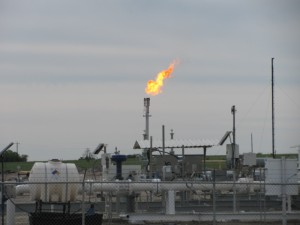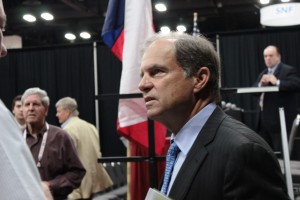How Oil & Gas Drillers Are Trying to Earn Cred with Environmentalists

Dave Fehling / StateImpact
Vented methane gas burns at processing facility in DeWitt County
When the Environmental Defense Fund and researchers from the University of Texas wanted to find out just how much methane gas was coming from natural gas production sites, they ended up getting “unprecedented” access. The researchers had approached nine, big oil & gas exploration companies, gaining permission to do testing on 190 production sites nationwide.
“It definitely took some conversations with these companies to build a comfort and a trust level that this wasn’t a ‘gotcha’ exercise but rather an exercise to improve the science,” said Drew Nelson, manager of the Environmental Defense Fund ‘s climate and energy program.
One of companies that agreed to cooperate was Irving-based Pioneer Natural Resources.
“I think they did more than just cooperate. They were a valuable resource for the study,” said Nelson.
Measuring Environmental Responsibility
Pioneer portrays itself as an environmentally responsible operator. Scott Sheffield is Pioneer’s CEO.

Dave Fehling
Scott Sheffield, CEO of Pioneer Natural Resources, at DUG convention in San Antonio
“We participated in the large, EDF study that just came out just to show the rest of the world that shale gas is not emitting as much as people thought. Very little. We go to extra efforts to recall all of the vapor gas at all of our sites. So it’s important economically and also for the environment,” Sheffield told StateImpact.
One indicator of how a company is complying with safety and environmental regulations can be found in data from the Railroad Commission of Texas which regulates the drilling industry. According to an analysis by StateImpact of that data, Pioneer had the most total alleged violations statewide for oil & gas operators in Texas.
From 2008 to 2012, the data showed Railroad Commission inspectors found 1,344 potential violations of state rules. Among the alleged violations were 593 for “water protection”, 145 for “identification of properties, wells and tanks”, and 351 for “cleanup of soil contaminated by a crude oil spill.”
Other big oil & gas operators in the state also had hundreds of alleged violations each with four companies exceeding a thousand in the 2008-2012 period. In an email, Pioneer said that as one of the state’s most active drillers, it’s also subject to more inspections. Pioneer said its 1,344 alleged violations were the result of some 4,000 inspections that covered some 20,000 regulated practices.
In an interview last month in San Antonio where he was speaking at the “DUG” energy industry convention, Pioneer’s Sheffield told StateImpact that the data are not at odds with how the company views itself as an environmental steward.
“Those violations are not true violations. They’re only things that (the inspectors) are observing when they go back and report. I don’t think Pioneer has been fined for any of those violations,” said Sheffield.
The Railroad Commission confirmed that for the years analyzed by StateImpact, the commission had issued no fines against Pioneer. The commission also said that in general, the majority of alleged violations are corrected by operators without the commission having to resort to “enforcement action.”
‘Business Friendly’
Which brings us back to the independent investigations done by environmental groups. Those groups often express doubt over the aggressiveness of government regulators, especially in Texas where some politicians promote the state as a place where regulation is “business friendly.” By giving environmental researchers access to well sites as happened in the methane gas study, environmentalists say the industry could gain credibility when it claims it’s producing oil & gas while protecting the air and water.
“I think a lot of companies realize their public license to operate is in the balance here. And they need to take steps to improve their image in the community,” said the Environmental Defense Fund’s Nelson. But he added that just participating in a study alone doesn’t earn a company a “gold star” for environmentalism.

